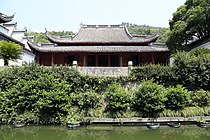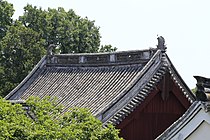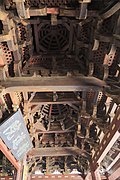| Revision as of 07:18, 16 July 2006 editWinBot (talk | contribs)39,167 editsm BOT - Unicodifying← Previous edit | Latest revision as of 13:39, 11 January 2025 edit undoNotAG on AWB (talk | contribs)Confirmed users1,720 editsm per TfD, replaced: {{IPA-wuu → {{IPA|wuu (2)Tag: AWB | ||
| (61 intermediate revisions by 46 users not shown) | |||
| Line 1: | Line 1: | ||
| {{Short description|Buddhist temple in Zhejiang, China}} | |||
| ⚫ | '''Baoguo Temple''' ({{zh |
||
| {{no footnotes|date=March 2016}} | |||
| ] | |||
| {{coord|29|58|57|N|121|30|58|E|display=title}} | |||
| ⚫ | == |
||
| ⚫ | The '''Baoguo Temple''' ({{zh|c=|p=Bǎoguó Sì|s=保国寺|t=保國寺|l=Temple of Homeland-Defending}}, {{IPA|wuu|pau koh zy}}) is a former ] ] temple located in the ] district, {{Convert|15|km|mi}} north of ], in Zhejiang Province, People's Republic of China. It is noted as the second oldest surviving wooden structure in southern China since the main hall of the present temple dates back to 1013 AD during the ]. | ||
| ⚫ | The temple was originally |
||
| ⚫ | ==History== | ||
| ⚫ | Today the temple is a tourist attraction, and many of its rooms and halls are used to house various exhibitions, including: | ||
| ⚫ | The temple was originally called the '''Lingshan Temple''' ({{Lang-zh|s=灵山寺|t=靈山寺|l=Temple of Divine Mountain|p=Língshān Sì}}, {{IPA|wuu|lin sae zy}}), but in 880 AD, during the ] it was renamed the Baoguo Temple. The main hall was rebuilt in 1013 AD, during the ], and is one of the oldest and most well preserved wooden constructions in China. The temple also contains columns dating to the Tang dynasty, a hall built during the ], and two halls and towers of the ]. | ||
| ⚫ | Today the temple is no longer a temple but a tourist attraction, and many of its rooms and halls are used to house various exhibitions, including: | ||
| *] statues | *] statues | ||
| *] bronzes | *] bronzes | ||
| Line 12: | Line 17: | ||
| *Miscellaneous architectural pieces from the temple compound | *Miscellaneous architectural pieces from the temple compound | ||
| *Famous places around China | *Famous places around China | ||
| {{Gallery | |||
| |width = 210 | |||
| |height = | |||
| |File:Ningbo Baoguo Si 2013.07.27 10-13-26.jpg| | |||
| |File:Ningbo Baoguo Si 2013.07.27 10-14-20.jpg| | |||
| |File:Ningbo Baoguo Si 2013.07.27 10-25-21.jpg| | |||
| |File:Ningbo Baoguo Si 2013.07.27 10-25-34.jpg| | |||
| |File:Ningbo Baoguo Si 2013.07.27 11-09-29.jpg| | |||
| |File:Ningbo Baoguo Si 2013.07.27 11-40-04.jpg| | |||
| |File:Ningbo Baoguo Si 2013.07.27 10-44-43.jpg| | |||
| |File:Ningbo Baoguo Si 2013.07.27 10-31-01.jpg| | |||
| |File:Ningbo Baoguo Si 2013.07.27 10-31-54.jpg| | |||
| |File:Ningbo Baoguo Si 2013.07.27 10-34-40.jpg| | |||
| |File:Ningbo Baoguo Si 2013.07.27 10-51-45.jpg| | |||
| |File:Ningbo Baoguo Si 2013.07.27 10-41-16.jpg| | |||
| |File:Ningbo Baoguo Si 2013.07.27 10-34-11.jpg| | |||
| |File:Ningbo Baoguo Si 2013.07.27 11-26-49.jpg| | |||
| |File:Ningbo Baoguo Si 2013.07.27 10-49-31.jpg| | |||
| |File:Ningbo Baoguo Si 2013.07.27 10-50-45.jpg| | |||
| }} | |||
| == Transport == | == Transport == | ||
| The temple can be accessed by bus |
The temple can be accessed by bus 332 from Ningbo city. The ride takes approximately 35 minutes. | ||
| == Entry == | |||
| Standard tickets are 12 yuan per person. Guides are available for an additional fee. | |||
| ==See also== | ==See also== | ||
| *] | *] | ||
| *] | |||
| ==External links== | |||
| {{commons category|Baoguo Temple (Ningbo)}} | |||
| * {{in lang|zh}} | |||
| * | |||
| * | |||
| {{Buddhist temples in China}} | |||
| {{Zhejiang topics}} | |||
| ] | ] | ||
| ] | |||
| ] | |||
| ] | |||
| ] | |||
Latest revision as of 13:39, 11 January 2025
Buddhist temple in Zhejiang, China| This article includes a list of references, related reading, or external links, but its sources remain unclear because it lacks inline citations. Please help improve this article by introducing more precise citations. (March 2016) (Learn how and when to remove this message) |

29°58′57″N 121°30′58″E / 29.98250°N 121.51611°E / 29.98250; 121.51611 The Baoguo Temple (simplified Chinese: 保国寺; traditional Chinese: 保國寺; pinyin: Bǎoguó Sì; lit. 'Temple of Homeland-Defending', Wu Chinese pronunciation: [pau koh zy]) is a former Mahayana Buddhist temple located in the Jiangbei district, 15 kilometres (9.3 mi) north of Ningbo, in Zhejiang Province, People's Republic of China. It is noted as the second oldest surviving wooden structure in southern China since the main hall of the present temple dates back to 1013 AD during the Northern Song dynasty.
History
The temple was originally called the Lingshan Temple (simplified Chinese: 灵山寺; traditional Chinese: 靈山寺; pinyin: Língshān Sì; lit. 'Temple of Divine Mountain', Wu Chinese pronunciation: [lin sae zy]), but in 880 AD, during the Tang dynasty it was renamed the Baoguo Temple. The main hall was rebuilt in 1013 AD, during the Northern Song dynasty, and is one of the oldest and most well preserved wooden constructions in China. The temple also contains columns dating to the Tang dynasty, a hall built during the Ming dynasty, and two halls and towers of the Qing dynasty.
Today the temple is no longer a temple but a tourist attraction, and many of its rooms and halls are used to house various exhibitions, including:
- Guanyin statues
- Confucian bronzes
- Ningbo furniture
- Traditional Chinese wedding attire
- Carved stone screens
- Miscellaneous architectural pieces from the temple compound
- Famous places around China
Transport
The temple can be accessed by bus 332 from Ningbo city. The ride takes approximately 35 minutes.
See also
External links
- Baoguo Temple Official Website (in Chinese)
- Baoguo Temple, English Description on Ningbo City Website
- Baoguo Monastery, Architectura Sinica Site Archive
| Zhejiang topics | |
|---|---|
| Hangzhou (capital) | |
| General | |
| Geography | |
| Education | |
| Culture | |
| Cuisine | |
| Visitor attractions | |















